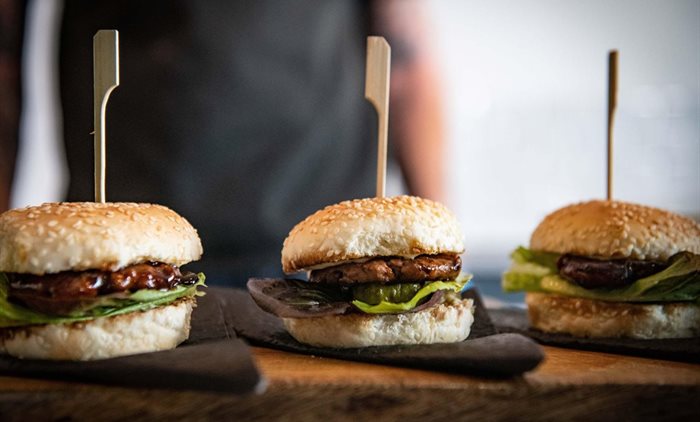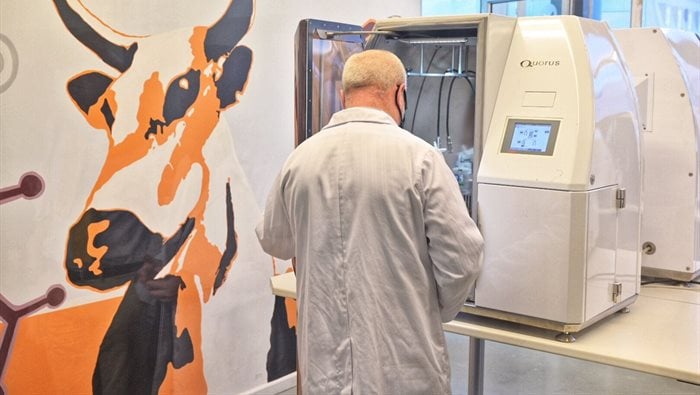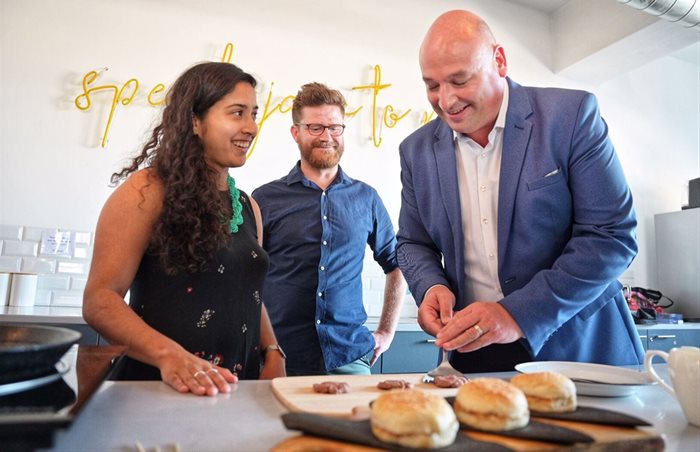South African cultivated meat company Mzansi Meat Co. has unveiled the continent' first lab-grown beef burger - a development described as a massive milestone for the brand and a breakthrough for food security in Africa.

Source: Mzansi Meat Co.
The burger was prepared at a bespoke event in Cape Town this week where co-founders Brett Thompson and Tasneem Karodia, together with the head of taste, Absie Pantshwa, had a bite of the burger alongside Alderman James Vos, Mayoral Committee Member for Economic Growth at the City of Cape Town.
From startup to scale up
Now that the first burger has been developed, Mzansi Meat Co’s next step is scaling up. “Cellular agriculture wasn’t an industry in Africa until Mzansi was born. Our burger is only the beginning, we now know it's possible and the next step is scaling up,” Thompson explains. “It starts with one small beef burger and we aim to be producing tons of cultivated meat every month in the future.”

Source: Mzansi Meat Co.
Adds Karodia, “We’re working on plans to scale up and move into a pilot production facility as well as a rollout plan with retailers and restaurant partners. Next up we’re developing sausages to go with the burger and our goal is to produce meat that can be used in traditional African cuisine. Everything we make will be braai-friendly and ready for the fire!”
Food system innovation
Africa’s population is growing and by 2050, the continent can expect another billion mouths to feed. The current agricultural landscape needs innovation to make it better. Tackling food security with an improved food system benefits the environment by reducing land use and water. Cultivated meat doesn’t require the killing of millions of animals, which means less intensive livestock conditions.

Source: City of Cape Town
As the company celebrates this milestone, getting here has been an intricate process. The journey begins at a local farm animal sanctuary where veterinarians remove tiny tissue cells from donor animals, who roam free with as little harm as possible.
Once the cells are harvested, a sample is placed in a nutrient-rich transport medium and taken to the Mzansi Meat Co. lab where they isolate the cells and grow them in a culture medium. This is a special type of food containing vitamins, salts and proteins that the cells need to develop and divide. Once they have enough cells, they place them on an edible structure and after adding a few additional spices and flavours, the cultivated meat is ready to served.
The company uses the BioCiti lab, which was established in 2019 by the Cape Innovation and Technology Initiative (CiTi), a City of Cape Town strategic business partner and Africa’s oldest tech ecosystem, which has been instrumental in supporting over 3,000 local entrepreneurs.

Tasneem Karodia and Brett Thompson from Mzansi Meat Co. with Alderman James Vos from City of Cape Town. Source: City of Cape Town
James Vos from City of Cape Town comments, "It is platforms such as these that have helped Cape Town gain a reputation as Africa’s startup capital. Cape Town is home to 38% of South Africa’s IT developers, the highest concentration of these in the country. During my time as Mayoral Committee Member for Economic Growth, I've witnessed how Cape Town startups such as Mzansi Meat Co are creating products that are not just world-first, but have a meaningful impact on people’s lives."
Mzansi Meat states that it aims to produce the same meat we know and love, just made in a better way to keep up with demand.







































